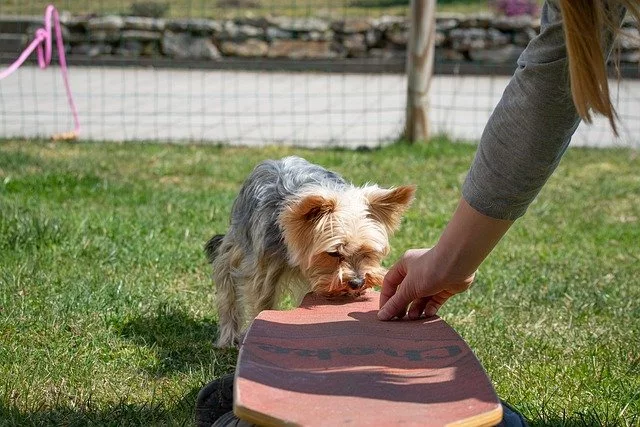Discover the dietary needs of Yorkshire Terriers in this informational post. Learn about dry and wet food options, homemade meals, raw food diet, treats, toxic foods, feeding schedule, and feeding puppies.
You may be wondering about the dietary needs of your beloved Yorkshire Terrier. It is important to provide them with a balanced and nutritious diet to ensure their overall health and wellbeing. In this article, we will explore the specific food requirements of Yorkshire Terriers and provide you with valuable insights on what you should include in their meals. Whether you are a new Yorkshire Terrier owner or simply want to enhance your pet’s diet, keep reading to discover the answer to the question, “What does Yorkshire Terrier eat?”
Dry Dog Food
Dry dog food, also known as kibble, is a popular choice for feeding Yorkshire Terriers due to its convenience and long shelf life. When considering the nutritional requirements for your furry friend, it’s essential to choose a brand that meets their specific needs.
Nutritional Requirements
Yorkshire Terriers require a balanced diet that includes protein, carbohydrates, fats, vitamins, and minerals. It’s important to look for dry dog food that is specifically formulated for small breed dogs, like Yorkshire Terriers, as their nutritional requirements differ slightly from larger breeds.
Small Breed Formula
Opting for a small breed formula ensures that the kibble is designed to meet the unique needs of Yorkshire Terriers. These formulas are typically packed with nutrients and have smaller kibble sizes, making it easier for your dog to chew and digest.
High-Quality Brands
When it comes to dry dog food, investing in a high-quality brand is crucial. Look for reputable brands that prioritize using real meat as the primary ingredient and avoid artificial additives, preservatives, and fillers. Reading the labels and understanding the ingredients will help you make an informed decision about which brand to choose.
Feeding Guidelines
Feeding guidelines vary depending on the age, activity level, and weight of your Yorkshire Terrier. It’s important to follow the recommended portion sizes provided by the specific brand you choose. Monitoring your dog’s weight and adjusting the portion accordingly will help keep them at a healthy weight. Always ensure that fresh water is available for your pup when feeding them dry dog food.
Wet Dog Food
Wet dog food, also known as canned food, is another option to consider when feeding your Yorkshire Terrier. It offers a different texture and flavor compared to dry food, and some dogs may find it more palatable.
Options for Yorkshire Terrier
There are various options available when it comes to wet dog food for Yorkshire Terriers. Look for formulas that are specifically tailored to small breed dogs to ensure they meet the nutritional needs of your Yorkie. Consider consulting with your veterinarian to find a suitable brand or recipe that your dog will enjoy.
Balanced Formulas
Similar to dry dog food, wet dog food should also provide a balanced diet for your Yorkshire Terrier. Look for formulas that include a variety of high-quality protein sources, such as chicken, beef, or fish. Vegetables and grains can also be included to provide additional nutrients. Checking the ingredients list and understanding the nutritional content will help you make an informed decision.
Portion Control
Since wet dog food tends to have a higher moisture content compared to dry food, it is essential to adjust the portion sizes accordingly. Consult the feeding guidelines provided by the brand and monitor your Yorkie’s weight to ensure they are receiving the appropriate amount of food. Remember to refrigerate any unused portions and discard them after a few days.
Combining with Dry Food
Some pet owners choose to combine wet and dry dog food to offer variety and provide additional texture. Mixing the two can also help encourage picky eaters to consume their meals. However, it’s important to maintain portion control and ensure that the overall diet remains balanced and meets your Yorkie’s nutritional needs.

Homemade Dog Food
Preparing homemade dog food for your Yorkshire Terrier can be a rewarding and personalized way to ensure they are getting the best nutrition possible. However, it requires careful consideration and attention to detail.
Benefits and Considerations
Homemade dog food allows you to have full control over the ingredients that go into your Yorkshire Terrier’s meals. You can select high-quality protein sources, grains, vegetables, and fruits based on your dog’s specific needs and preferences. However, it’s crucial to consult with a veterinarian or veterinary nutritionist to create a balanced recipe that provides all the necessary nutrients.
Balanced Ingredients
When preparing homemade dog food, it’s important to include a combination of lean proteins, carbohydrates, healthy fats, and essential vitamins and minerals. Lean meats like chicken, turkey, or fish can serve as the primary protein source, while vegetables and grains provide fiber and additional nutrients. Ensuring a balance of ingredients is crucial for your Yorkshire Terrier’s overall health.
Cooking Methods
Cooking methods can vary when preparing homemade dog food. Some ingredients may need to be cooked thoroughly, while others can be served raw or lightly cooked. Always prioritize food safety and be aware of ingredients that are toxic to dogs, such as onions and garlic. Avoid using excessive seasonings or spices, as they can be harmful to your dog.
Recipes to Consider
There are numerous homemade dog food recipes available that cater specifically to Yorkshire Terriers. These recipes often include a combination of protein, vegetables, and grains to provide a balanced diet. Some popular recipes include chicken and sweet potato, beef and rice, or fish and vegetable medleys. Remember to incorporate variety and consult with a professional to ensure the recipe is appropriate for your dog’s needs.
Raw Food Diet
The raw food diet, also known as the raw feeding diet, entails feeding your Yorkshire Terrier raw, uncooked ingredients. This diet has gained popularity among some pet owners who believe it mimics a dog’s natural diet in the wild.
Principles of Raw Feeding
The raw food diet is based on feeding your dog whole raw foods, such as raw meat, bones, fruits, and vegetables. Supporters of this diet believe that it provides a more natural and biologically appropriate way of nourishing your dog. However, it’s important to note that raw feeding requires careful attention to ensure a balanced and safe diet.
Benefits and Risks
Supporters of the raw food diet claim that it can improve overall health, promote healthy digestion, enhance coat condition, and increase energy levels in dogs. However, there are also risks associated with raw feeding, such as a higher chance of bacterial contamination and potential nutritional imbalances. It’s crucial to thoroughly research and consult with a veterinarian before transitioning your Yorkshire Terrier to a raw food diet.
Protein Sources
Protein is a vital component of a Yorkshire Terrier’s diet, and raw feeding emphasizes the use of raw uncooked meat as the primary protein source. This can include a variety of options such as chicken, turkey, beef, lamb, or fish. It’s essential to source high-quality, human-grade meats and handle them safely to minimize the risk of bacterial contamination.
Supplements and Additions
To ensure a balanced diet when feeding raw, it may be necessary to add supplements or additional ingredients. This can include omega-3 fatty acids, calcium, vitamins, and minerals. Consulting with a veterinarian or veterinary nutritionist is essential to determine the appropriate supplements and additions for your Yorkshire Terrier’s specific needs.

Treats and Snacks
Treats and snacks play an important role in training, rewarding good behavior, and providing additional enjoyment for your Yorkshire Terrier. However, it’s crucial to choose healthy options and exercise moderation.
Training Treats
Training treats should be small, soft, and easily digestible. Look for options that are specifically formulated for small breed dogs like Yorkshire Terriers. These treats are designed to be low in calories, so your dog can enjoy them without consuming excessive amounts.
Healthy Snack Options
When it comes to snacks, there are various healthy options available for Yorkshire Terriers. Consider offering your dog small pieces of fruits like blueberries or apple slices (without seeds), or vegetables such as carrot sticks or cucumber slices. These snacks provide vitamins and minerals while keeping calorie intake in check.
Avoiding Harmful Ingredients
It’s important to be aware of harmful ingredients that should be avoided in dog treats and snacks. These can include artificial sweeteners like xylitol, chocolate, grapes, raisins, onions, and garlic, as they can be toxic to dogs. Always read the ingredient labels carefully and choose treats that are free from these harmful substances.
Moderation is Key
While treats and snacks can be a delightful addition to your Yorkshire Terrier’s diet, it’s crucial to practice moderation. Excessive treat consumption can lead to weight gain and nutritional imbalances. Treats should make up a small portion of your dog’s overall calorie intake. Use them sparingly and be mindful of their impact on your dog’s health.
Avoiding Toxic Foods
Certain foods that are considered safe for humans can be toxic to dogs, including Yorkshire Terriers. It’s essential to be aware of these toxic foods to keep your furry friend safe and healthy.
Common Toxic Foods
Some common foods that are toxic to dogs include chocolate, caffeine, grapes, raisins, onions, and garlic. These foods can cause severe health issues and should be avoided entirely.
Chocolate and Caffeine
Chocolate and caffeine contain substances called methylxanthines, which can be toxic to dogs. It’s crucial to keep all chocolate products and caffeinated beverages out of your Yorkshire Terrier’s reach.
Grapes and Raisins
Grapes and raisins can cause kidney failure in dogs, including Yorkshire Terriers. It’s important to keep these fruits away from your dog and ensure they don’t accidentally consume them.
Onions and Garlic
Onions and garlic contain compounds that can damage a dog’s red blood cells, leading to a condition known as hemolytic anemia. Even small amounts of onion or garlic can be toxic to Yorkshire Terriers and should be avoided.

Feeding Schedule
Establishing a consistent feeding schedule for your Yorkshire Terrier is important to maintain their overall health and well-being. It provides structure and ensures they receive the appropriate amount of food throughout the day.
Meal Frequency
Yorkshire Terriers generally do well with two to three meals per day. Puppies may require more frequent meals to support their growth and development. Consult with your veterinarian to determine the optimal meal frequency for your specific Yorkshire Terrier.
Recommended Portions
Feeding portion sizes can vary depending on your dog’s age, weight, and activity level. Follow the feeding guidelines provided by the brand or consult with your veterinarian to determine the appropriate portion size for your Yorkshire Terrier. Monitor your dog’s weight and adjust portions as needed to maintain a healthy weight.
Adjusting for Age and Activity
As your Yorkshire Terrier ages or becomes more or less active, it’s important to adjust their portion sizes accordingly. Puppies will require more food to support their growth, while seniors may need fewer calories to prevent weight gain. Regularly assess your dog’s weight and consult with your veterinarian for guidance on adjusting their diet.
Monitoring Weight and Health
Regularly monitoring your Yorkshire Terrier’s weight and overall health is crucial to ensure they are thriving on their current diet. Look for signs of weight gain or loss, changes in coat condition, energy levels, and bowel movements. Any significant changes should prompt a visit to the veterinarian to evaluate their nutritional needs.
Feeding Puppies
Feeding puppies, including Yorkshire Terrier puppies, requires special attention to support their growth and development. Providing them with the nutrition they need from an early age is essential for their overall health.
Special Nutritional Needs
Puppies have unique nutritional needs due to their rapid growth and development. They require higher levels of protein, fat, vitamins, and minerals to support their growing bodies. Choosing a puppy-formulated food is important to meet these specific needs.
Transitioning from Mother’s Milk
When puppies are weaned from their mother’s milk, it’s important to gradually transition them to solid food. Begin by introducing small amounts of wet or dry puppy food mixed with warm water to create a porridge-like consistency. As they become more comfortable, gradually decrease the amount of water and increase the amount of solid food.
Puppy-Formulated Food
Puppy-formulated food is specifically designed to meet the increased nutritional needs of growing puppies. It provides a higher calorie content and essential nutrients necessary for proper growth and development. Always choose a reputable brand and consult with your veterinarian for specific recommendations.
Feeding Guidelines
Follow the feeding guidelines provided by the brand of puppy food you choose. These guidelines are typically based on your puppy’s age, weight, and expected adult size. Monitoring your puppy’s weight and adjusting the portions accordingly will help ensure they are receiving the appropriate amount of food.
Feeding Senior Yorkshire Terriers
As Yorkshire Terriers age, their nutritional needs change, and adjustments may be necessary to cater to their changing requirements. Providing a diet that supports their aging bodies is essential for maintaining their quality of life.
Changing Nutritional Needs
Senior Yorkshire Terriers may require a diet that is lower in calories and fat to prevent weight gain and reduce the risk of obesity-related health issues. They may also benefit from increased fiber to support digestion and joint-supporting ingredients to promote mobility. Consulting with your veterinarian will help determine the appropriate changes to their diet.
Reduced Calorie Diet
To prevent weight gain and promote a healthy weight, consider transitioning your senior Yorkshire Terrier to a reduced-calorie diet. Look for senior-specific formulas or weight management options that are designed to meet their nutritional needs while helping to maintain a healthy weight.
Joint Health
As Yorkshire Terriers age, their joints may become less flexible, and they may experience conditions like arthritis. Including ingredients such as glucosamine and chondroitin in their diet can help support joint health. Consult with your veterinarian to find a suitable diet that promotes joint health for your senior Yorkshire Terrier.
Regular Vet Check-ups
Regular veterinary check-ups are essential for senior Yorkshire Terriers to monitor their overall health and address any specific dietary needs. Your veterinarian will be able to assess their weight, joint health, and overall well-being and make necessary recommendations to ensure they are getting the nutrition they need.
Special Dietary Considerations
Some Yorkshire Terriers may require special dietary considerations due to specific health conditions, allergies, or sensitivities. It’s important to address these concerns and provide a diet that supports their unique needs.
Food Allergies and Sensitivities
Yorkshire Terriers, like any other breed, can develop food allergies or sensitivities. Common allergens include ingredients such as beef, chicken, grains, or dairy products. If you suspect your Yorkshire Terrier has a food allergy or sensitivity, consult with your veterinarian to determine the best course of action, which may involve an elimination diet or a restricted ingredient diet.
Restricted Ingredient Diets
Restricted ingredient diets are formulated to exclude common allergens or ingredients that may cause sensitivities in some dogs. These diets typically contain a limited number of protein and carbohydrate sources, making it easier to identify potential allergens. Consult with your veterinarian to determine if a restricted ingredient diet is necessary for your Yorkshire Terrier.
Grain-Free Options
While grain-free diets have gained popularity in recent years, it’s important to understand that grains themselves are not inherently harmful for dogs. However, some dogs may have specific grain allergies or sensitivities. Consult with your veterinarian to determine if a grain-free diet is necessary for your Yorkshire Terrier based on their specific requirements.
Prescription Diets
In some cases, specific health conditions may require your Yorkshire Terrier to be on a prescription diet. These diets are formulated to address certain medical conditions, such as kidney disease, urinary issues, or digestive disorders. Always follow your veterinarian’s recommendations and ensure your dog is receiving the appropriate nutrients for their specific condition.
In conclusion, feeding your Yorkshire Terrier a nutritious and well-balanced diet is crucial for their overall health and well-being. Whether you choose dry dog food, wet dog food, homemade meals, a raw food diet, or a combination, it’s important to prioritize their specific nutritional requirements. Consult with your veterinarian to determine the best feeding plan for your Yorkshire Terrier, and always monitor their weight and overall health to ensure they are thriving on their chosen diet. Remember, a happy and healthy pup starts with nutritious and delicious meals!





